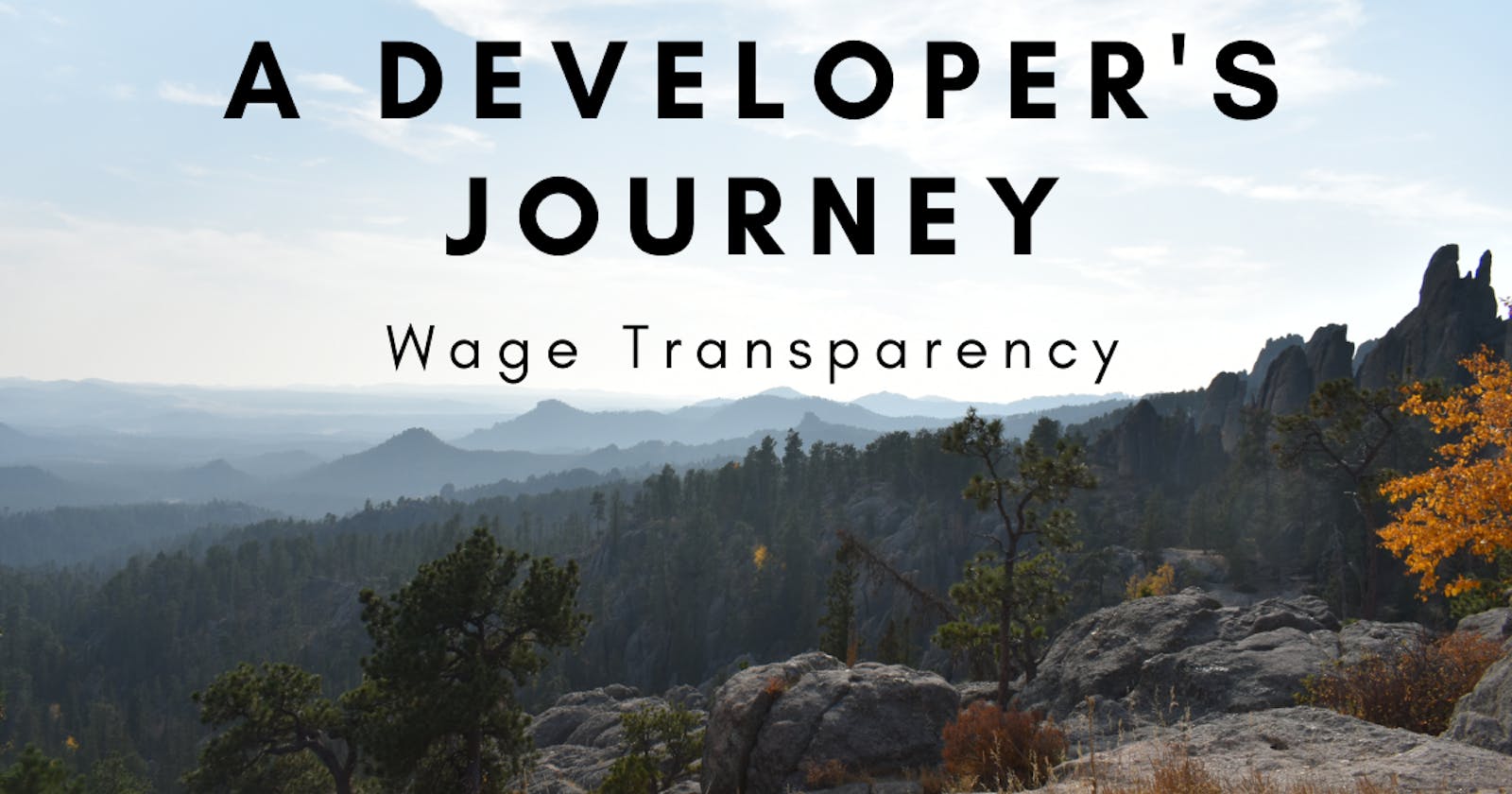Why wage transparency matters
If you've seen my posts on LinkedIn or Twitter then you already know where I stand on the subject of wage transparency. This article is a little bit of my personal history with the subject.
If you're like me, your school taught you things like:
- Math
- Science
- History
- Language
Your parents taught you things like:
- How to tie your shoes
- Chew with your mouth closed
- Take care of your hygiene
- Try to be a decent human being
Along the way, you probably picked up some things without being explicitly taught. You likely learned to manage conflict in your life the same way you witnessed adults managing conflict.
The same can be said about wage discussion. If the role models in your life were open and direct about their compensation, you were more likely to feel safe discussing this topic. Or, as is also often the case, you rebel in the complete opposite direction.
My parents did not discuss their pay. In fact, my parents had a policy of privacy which usually led to a life of lies outside the home. Friends, neighbors, and colleagues were kept at more than arms distance. We were not to discuss any 'family matters' (including Holiday plans, promotions or new jobs, food in the cupboards, etc) outside of the home. Some of you may find this odd, but for me, it was normal.
When I started my first paying job I had developed the mentality that I was beholden to my employer. That to succeed, I was to have a "yes man" attitude, never questioning anything. Keep your head down, do as you are told, and be grateful for what they decide to give you.
As can be said for most people, I went through several phases of development in my life. At some point, I started to see things a little differently. I became aware that people are just people, that having the title Manager or CEO didn't magically make them immune to error or misjudgment.
Strike One
In 2012 I had my first (that I am aware of) encounter with less-than-honest business practice. I worked for a small chiropractic office which had excessive turnover (red flag!). The person training me had only been there a week. Nevertheless, I felt compelled to do my job well and not ask questions. I worked when I was asked for as long as I was asked. Most days I was the first to arrive and the last to leave. After some time I did the math on my pay stubs and realized I wasn't being paid overtime. I finally mustered the courage to ask my boss about it, and his reply was "we don't pay overtime here."
I can see the shock on your face. You are probably having the same reaction my friend did when I told her this story years later. "Uh... overtime pay is not OPTIONAL." I didn't know, and I would never have known had I continued on the path of keeping my head down, not discussing "private" matters. For those wondering, by the time I knew better, the statute of limitations had already passed, I was no longer eligible to recover those lost wages.
Strike Two
Not long after, in 2014, I was promoted to my first management position. I had been working with the company for nearly a year and knew the employee handbook well. The one which said, "Employees are not to discuss their wages." When I became a manager I went from believing this was an acceptable practice to enforcing it.
Every new hire got the same handbook from me, got the same spiel about the way we did things, and agreed to it just as I had. Well, almost everyone. After several months of hiring and training, I encountered an individual more outspoken than the rest. We had a fairly good relationship, he was a good employee, but one day he shocked me. He had the audacity to blatantly ask me about my pay. As a person taught to protect such personal information, I was embarrassed. As his manager, I was upset that he had broken a rule.
I don't remember my exact words, something along the lines of "consider this a verbal warning, you cannot discuss that here," to which he replied, "Out of respect for you I won't, but I believe in wage transparency."
Imagine my shock a few weeks later, while attending a "crash course for first-time managers" conference, when the speaker announced that companies were in no way allowed to prevent or prohibit employees from discussing their wages. Shocked was an understatement. I felt embarrassment, shame, frustration, and a call to action.
I marched back to the office that afternoon with a copy of the NLRB's concerted activities pulled up on my laptop and began discussing the necessary change with the owner of the company. She behaved surprised and agreed that we should remove the verbiage from the employee handbook, but she also insisted that the change not be announced. Understandable from her position, as no one wants to inspire backlash for their mistakes, but it made me think she knew all along what she was doing was wrong.
Strike Three
Flash forward a few months and I discover Glassdoor. After perusing for a bit I come to realize that the $1/hr raise I received when I moved from administrative assistant to office manager was... well... bullshit. I again approached the owner of the company, fear in my heart thinking I was being rude or ungrateful asking for more. She didn't hesitate to increase my pay from $30k to $50k, again she knew what she was getting away with, I was the naive one.
Standing Up
I realized I needed to get familiar with my rights as an employee and ensure that those rights were not infringed upon again. I became an advocate for myself and felt the need to speak out about my experiences.
By the time I accepted a new job in 2017, I knew what my skills were worth, I knew what (some of) my rights were, and I knew what I wanted out of a job. I felt it was important to be clear about these things from the beginning, which is why I expressed my needs during the interview process. I advised that I was seeking a job that did not occupy my personal time, that I could leave behind at the end of the day.
Then, when that very job began asking me to be responsive to after-hours slack messages and insisted that I do not leave early when I was asked to start early, and finally demanded that I be available during my vacation, I spoke up. I discussed with HR the law, which was referenced in the handbook, that stated all hours worked must be accurately accounted for. When they responded that I should take more of an "ownership" approach, and be more flexible, I turned in my resignation.
The unfortunate truth
In May of 2019, I took a temporary position with a local Golf Club. It was an unusual role for me, but I was new to the area and trying to figure out what career path I wanted to take.
Now this place has way more going on than just a wage transparency issue. I remember my boss very seriously telling me in a shocked and almost appalled voice how the club has some couples in which the wife is the member, rather than the husband. The dude is seriously stuck in a sexist mindset that has no business in the modern workplace.
Anyway, I was working my ass off and felt a strong sense of an impending job offer. This was my first job in a new state, and also my first of this sort. I did some research online but was feeling completely lost regarding what would be a reasonable wage for my position. I had been having lots of great conversations with a colleague in a similar role and decided I could ask for her input. She froze, and her reply was "we are not allowed to talk about that" - for the first time I said with confidence "Yes, you are. I will not push if you are not comfortable, but it is important that you know that companies cannot stop you from discussing pay."
I was fired the next day.
I really wish I could tell you that I was redeemed, reinstated, granted unemployment, or in some other way rewarded for doing the right thing. I did exactly what I was supposed to. I reported the company to the NLRB, sent a copy of the handbook which had the language forbidding employees from discussing wages, and gave my statement to one of their agents.
At the end of the day, they were unable to prove that my dismissal was a direct result of discussing compensation. Of course, they documented my dismissal as "not the right fit." No company is going to give details about a dismissal which could bite them in the ass. However, the other reason they couldn't prove it is just as important. The colleague I spoke to was me from years prior. She was unaware of her rights as an employee and afraid to speak up when the agent asked if she had reported our conversation to management. She, like me from the past, believed she was doing the right thing.
They did require that the company update its handbook and announce the changes made to all employees. I hope that made a difference, but I'll likely never know.
Have your own back
I don't mean to paint all companies in the same light. I know there are some that are more honest and take initiative to create good environments for their employees. I am not saying all employers are evil and out to get you. What I am saying, is to know your rights. To know your worth. Stand up for yourself and your peers. You may end up like me, being dismissed from a job you probably didn't want to be in any way, you may be the next Snowden, or you may be the reason for change.
The way things are now only benefit the corporations, the big businesses, the ones who can afford teams of lawyers, and who know exactly how to get away with breaking the law.
Maybe, just maybe, if we spread awareness, if we learn about our rights and teach our peers and our children...maybe we can empower each other. Maybe the next time someone participates in concerted activity, their coworkers will join them rather than act against them out of fear or naivety.
This is how we create change.

